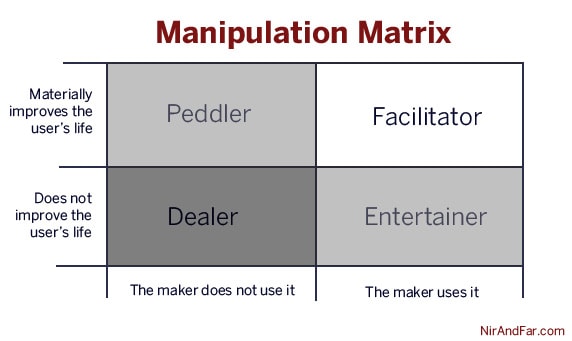Bogost was only half correct comparing technology to the cigarette. Certainly, the incessant need for a smoke in what was once the majority of the adult population has been replaced by a nearly equal compulsion to constantly check our devices. But unlike the addiction to nicotine, new technologies offer an opportunity to improve the lives of users dramatically. It’s clear that like all technologies, recent advances in the habit-forming potential of web innovation have both positive and negative effects.
But if the innovator has a clear conscience that the product materially improves people’s lives—first among them, the creator’s—then the only path is to push forward. Users bear ultimate responsibility for their actions and makers should not be blamed for the misuse or overuse of their products.
However, as the march of technology makes the world a more habit-forming place, innovators need to consider their role. It will be years, perhaps generations, before society develops the antibodies to new social harms. In the meantime, users will have to judge the yet unknown consequences for themselves, while creators will have to live with the moral repercussions of how they spend their professional lives.
My hope is that Manipulation Matrix helps innovators consider the implications of the products they create. Perhaps after reading this, you’ll start a new business. Maybe you’ll join an existing company with a mission you believe in. Or, perhaps after reading this you’ll decide it’s time to quit your job, which you now realize no longer agrees with your moral compass.
Thank you to Amy Jo Kim, Jess Bachman, Max Ogles for reading early versions of this essay.
Photo Credit: byJess.net and Sarah G…




 Today Facebook will sell shares in one of the biggest tech IPOs in history. New investors will gobble up the stock to get a piece of the global phenomenon famously started in Mark Zuckerberg’s dorm room in 2004. But while owning the stock will have quantifiable value when it trades on the open market, few buyers will be able to say truthfully that they understood the value of the company just a few years ago.
Today Facebook will sell shares in one of the biggest tech IPOs in history. New investors will gobble up the stock to get a piece of the global phenomenon famously started in Mark Zuckerberg’s dorm room in 2004. But while owning the stock will have quantifiable value when it trades on the open market, few buyers will be able to say truthfully that they understood the value of the company just a few years ago.